As the 6OGs prepare for our end of 2023 roundups, covering the landscape of all that crossed our hearts and ears this year, we have one final “regular” post of the year. And although at first blush, the post covers three wildly different artists, the throughline for them is that each inhabits and recreates a world and sound unto itself: a rolling Texas landscape, a garage in Wales, and a smoky pub (or many of them) in Ireland. When it’s good, music transports you to another part of yourself; when it’s great, it can do so by taking you to another part of the world as well. We hope you enjoy the listens, and travel. See you soon for the end of the year as we know it.
New album: Poet’s Tooth by Tele Novella. There’s an old joke about a guy who walks into a bar in Texas and when he asks what type of music the bar features, he’s told “we have both kinds: country and western.” Not a very good joke, and for most of my life, I’ve also felt that it didn’t match a reality in which the “and western” side of the genre has all but disappeared. But on its new record, Poet’s Tooth, Austin’s Tele Novella puts the “and western” squarely back in the mix, along with indie rock, pop, and even a little dance (they are on the Kill Rock Stars label, after all) to put together a record that sounds like no other I heard in 2023.
When you hear a band with a name like Tele Novella, perhaps, like me, you imagine sweeping romantic epics, songs with endless amounts of drama, maybe something along the lines of a narcocorrido? Certainly would imagine cumbia being involved somehow. Instead (and happily), the Austin, TX outfit sounds less like an actual telenovela and more like a grainy western of old, with both grand landscapes and intense detail about the characters, with long pans of rolling tumbleweeds and super intense close-ups of a cowboy puffing the last of a hand-rolled cigarette and the last shadow of a betrayed mistress.
And although the songs are less about cowboys and more about characters navigating modern love and life, the feeling is central to the record. The album opens with exactly this emotional landscape on “Young and Free,” with a winsome acoustic guitar and distant vocal from Natalie Robbins: “When your heart is longing/Because you're young and free/Already, there's a sadness for/Things you haven't yet seen/When you feel that yearning/To make the world brand new.” That combines with a soft trot of percussion and beautiful orchestration that almost instantly sets you to dreaming.
From the more ethereal, the album transitions directly to one of its most powerful songs, “Hard-Hearted Way,” a direct counter from Natalie Robbins to a former lover who is stuck in a toxic emotional place. The vocals kick in right away, with Robbins going from low to high pitch in an instant, reflecting her emotional rollercoaster. The lyrics are as vulnerable and clear as any I’ve heard: “What a hard-hearted way/that you gaze into me/How you hate what you see/that reminds you of you/I'm not brave, but I'm not afraid/of mistakes I have made/But you won't let them fade/What can I do for you.”
The early power of the record continues with “Broomhorse,” a painful but open and funny tune about a couple that is ready to take on the world even though they can’t pay their bills and are resigned to entertaining themselves by riding on a different kind of home entertainment system. The album’s high point, if its quietest, comes directly in the middle with “Vampire Cowgirl,” where Robbins’ vocals cover an extraordinary range of tones and textures, and the music is western-forward, with instrumentation and structure that, again, takes you to a wilderness somewhere amidst rock formations in the Four Corners. And in the distance, at least for the subject of the song, was a specter, or maybe a woman, or maybe both? “You came barrelin' down/Rabid with some talk/Of a gal who rides at night/Picking off the stock/There you saw her for yourself/Of that, you're sure/I have never seen a man/Cry like that before.” The beauty of this song, and indeed the album, is that it takes you not only into the song, but into the characters. So at once you feel like you are watching the scene and a part of it, both because of the beauty of the lyrics and the transcendence of the music.
The record drifts to some degree from there, at least for me, not because the songs are of lesser quality but perhaps because it’s hard to remain in another world for so long. “Rodeo Clown” and “Changeless Kingdom” each feel like they’re straight from the soundtrack of a Jarmusch-directed western. The title track pushes a bit to the edge when its lyrics contain things like “somnambulist” and “waxing gibbous.” Robbins is always captivating to listen, but like most any western, sometimes the symbolism and imagery overtakes what the listener can handle without losing interest.
In this excellent review of the record from Pop Matters, Tele Novella was dubbed “art-country,” a take on the notion I started with, that this is both country and western. Regardless of what we call it, this is a rare record that takes you sonically to a time and place from the past but somehow populates them lyrically with themes and characters from today. It’s definitely worth the trip. (Brad)
Album from an upcoming/recent live show: Rare Birds: Hour of Song by The Bug Club. Is this the music you like?
The band is a garage rock power trio. They feature agile lead guitar, loping bass, active drums. Hooks abound. There are female and male singers harmonizing, yelling. The lyrics are evocative, funny, wistful, and memorable: “I wish that I was funny/I wish that I was funny/I wish that I was funny/As a hard-back book/About jokes.”
Is this the music you like?
The lead singer looks like a sensitive Kevin Smith. He shreds on guitar. The bassist, who also sings a lot, is basically a Welsh punk bassist ringer for Natasha Lyonne. She has a stadium level presence. The drummer is steady. His hair is short and round.
Is this the music you like?
They seem a bit nervous at the beginning. They are charmingly unpolished when it comes to stage banter. There is no apparent choreography, per se, but as they get comfortable, they naturally fall into classic rock and punk gestures. They bounce all over the stage, they share a mike for vocal high points.
Is this the music you like?
Two songs in, the band has won the crowd over completely, and somehow the good feelings only intensify as they play more than 25 songs in roughly 90 minutes. The set features a mix of new songs and newer songs; as they note, all of their songs are new, really. They’ve put out three albums of fresh material this year, and each one is well worth your time.
This is the Bug Club. This is the most fun I’ve had at a show in years. This is the music I like. (Marc)
Album (um, songs) being rediscovered (at least 10 years old): Shane MacGowan died on November 30 at age 65. He lived a hard life that involved alcohol and drug abuse, along with other illnesses. He was also a true poet whose lyrics paint a picture of anger, despair, longing, regret, beauty, love, resentment, and hope; sometimes, all in the same song.
And whiskey. Never forget the whiskey, often a key element of some of MacGowan’s best songs.
I first discovered The Pogues way back in the summer of 1986 when, as a 14-year-old, I heard “A Pair of Brown Eyes” off of Rum, Sodomy & the Lash. I was hooked. Since then, The Pogues and MacGowan were in my life as much as any band or artist. To this day, I still regularly return to their five proper albums (all respect to Spider Stacy, but I pretend Waiting for Herb and Pogue Mahone never happened). In the mid-2000s, after MacGowan reunited with his former bandmates for a series of shows (and after recording with the good-but-not-the-same Shane MacGowan & the Popes), I was lucky enough to finally see the reunited Pogues play at DC’s 9:30 Club with a fellow Pogues-obsessed friend (hey, Phil!).
They were amazing that night, even better than I could have hoped (and certainly not ruined by all the meatheads in attendance wearing green rugby shirts who might as well have been drinking green beer and wearing “Kiss me, I’m Irish” pins). That same friend reached out to me today to reminisce about the show, notable since it’s been way too long since we’ve spoken. But that’s why we all get a little sad when we lose an artist who is personally meaningful, without ever actually knowing them – news of the artist’s death reminds us of our own life experiences and how the music is always there, either in the background or front and center.
So, in honor of Shane MacGowan, it’s time for another list. If you are a fan, and you want to honor Shane’s life and work by holding your own personal wake, play the songs listed below, and of course feel free to add any of your favorites. These songs are perfect whether you want to mourn, celebrate, or both. And don’t forget the beer and whiskey (‘cause Shane is going far away). Songs are not listed in a particular order, and for anyone not familiar with The Pogues’ discography, the album is identified in parentheses.
(1) “The Body of an American” (Poguetry in Motion EP) – Suitable for any wake, so much so that David Simon used it prominently on The Wire whenever the show portrayed a “wake” in a bar after a cop left the Baltimore police force. The only song on this list not on one of the five proper albums (although it eventually made its way onto a reissue of Rum, Sodomy & the Lash) but one of MacGowan’s best.
(2) “Streams of Whiskey” (Red Roses for Me) – From their debut album, this song was essentially The Pogues’ mission statement (“And now that I’ve a pile, I’ll go down to the Chelsea / I’ll walk in on my feet but I’ll leave there on my back”). It also gave the listener a good idea of what MacGowan wanted out of life at the time. While he eventually made some attempts at getting sober, it’s a safe bet that wherever he is now, streams of whiskey are flowing.
(3) “Sally MacLennane” (Rum, Sodomy & the Lash) – Another early favorite of mine. The song starts as the story of a young man who leaves his job at a small Irish pub to find his fortune and becomes a song about death, regret, and drinking. The metaphors in the song are not subtle (“We walked him to the station in the rain / And we kissed him as we put him on the train / And we sang him a song of times long gone/ But we knew that we’d be seeing him again”), but they are incredibly effective and beautifully written. If it’s not used at Shane’s memorial, feel free to use it at mine.
(4) “If I Should Fall From Grace With God” (If I Should Fall From Grace With God) – Who hasn’t experienced a moment of doubt about themselves at some point? And who could express it while contemplating mortality in the same manner as Shane MacGowan? “If I should fall from grace with God / Where no doctor can relieve me / If I’m buried ‘neath the sod / But the angels won’t receive me / Let me go, boys.” Hell of a way to kick off an album.
(5) “A Pair of Brown Eyes” (Rum, Sodomy & the Lash) – A memorial needs some melancholy, and this song certainly has it. An old drunk in a pub talks to a young drunk about the war and his lost love, causing the young drunk to think about “a pair of brown eyes that waited once for me.” It’s a masterful, gorgeous song filled with sadness but also hope, as the young drunk vows to go rovin’ for a pair of brown eyes.
(6) “White City” (Peace and Love) – It’s important to remember that MacGowan started out in a punk band and remained a punk at heart throughout his life. In this song, Shane expresses his anger and frustration at London losing its character (“And the car-parks going up / And they’re pulling down the pubs / And it’s just another bloody rainy day”), even though he never romanticized the seedier side of the city in earlier years. MacGowan wasn’t always political, but when he was, it was clear the side he was on.
(7) “Fiesta” (If I Should Fall From Grace With God) – It’s also important to remember MacGowan’s playful side, as this song is just fun. Taking on the role of Francisco Vasquez Garcia of Almeria in this rollicking first-person exhortation of “rambling boys of pleasure” and “ladies of easy leisure,” The Pogues are clearly having a blast on this one. As will anyone else who hears this song, who will surely be inspired to grab some “brandy and half corona.”
(8) “The Sick Bed of Cuchulainn” (Rum, Sodomy & the Lash) – A dying man is remembering his life of drinking, fighting and mayhem. He recounts his exploits (“They took you up to midnight mass / Left you in the lurch / So you dropped a button in the plate / And spewed up in the church”) before finally succumbing at the end, or so we’re led to believe (“Then they’ll take you to Cloughprior / And shove you in the ground / But you’ll stick your head back out and shout / ‘We’ll have another round’”). The first track on Rum, Sodomy & the Lash. “A Pair of Brown Eyes” hooked me, but “The Sick Bed of Cuchulainn” reeled me in. Part of me hopes that MacGowan wrote this song wanting people to think of it when he passed.
(9) “The Broad Majestic Shannon” (If I Should Fall From Grace With God) – Arguably MacGowan’s most beautiful song, and definitely one of my favorites. “Take my hand and dry your tears, babe / Take my hand, forget your fears, babe / There’s no pain, there’s no more sorrow / They’re all gone, gone in the years, babe.” I’m not Irish or of Irish descent, but it’s another song that, if not played for Shane, can be played for me.
(10) “Sunny Side of the Street” (Hell’s Ditch) – Sort of a spiritual sequel to “The Sick Bed of Cuchulainn.” MacGowan sings about overcoming demons and self-destruction to reach a more peaceful life. To be fair, at the time of this album’s release, MacGowan had not attempted to get sober – that wouldn’t happen for roughly another 25 years. And regardless of how successful he was in his attempts, the song gives a hint at how MacGowan would change as he got older, and that there was more to him than the wild drunk that was a favorite of the British tabloids.
(11) “Turkish Song of the Damned” (If I Should Fall From Grace With God) – MacGowan and The Pogues loved a good sea shanty, and this one comes with menace. Co-written with fellow Pogue Jem Finer, it’s a song about superstition on the high seas with the death always lurking (“The spectre on my back will soon be free / The dead have come to claim a debt from me”).
(12) “Fairytale of New York” (If I Should Fall From Grace With God) – What else could I end on? The Pogues’ biggest hit (also co-written by MacGowan and Finer), reaching #2 in the UK on its original release, and consistently one of the most popular songs in the UK during the Christmas season. And for the purposes of this exercise, if you’re planning an imaginary wake for Shane MacGowan, nothing will inspire a group sing-along like the chorus to “Fairytale of New York,” especially if that group has already downed its share of pints and whiskeys. (Brian)

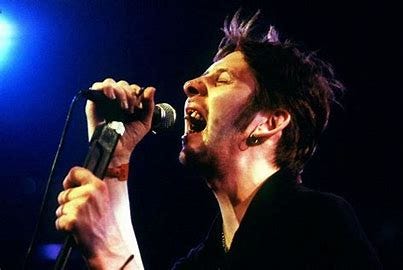


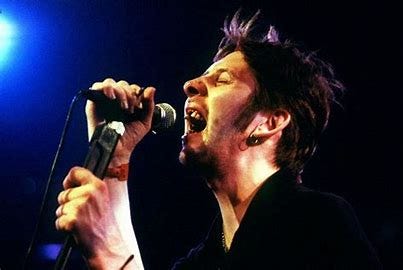
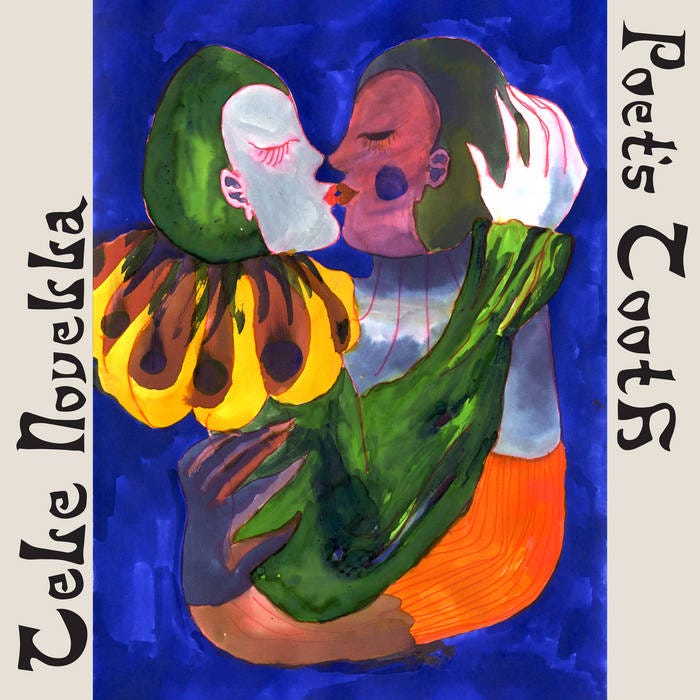
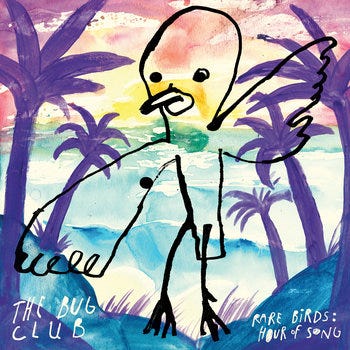
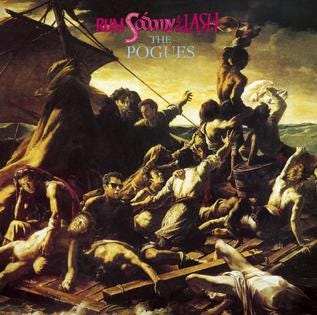
Two more Pogues: Old Main Drag (lyrics plus how he sings them just tear you up) and Young Ned of the Hill (such visceral anger at a guy who died over 350 years ago really shows how history is still with us).